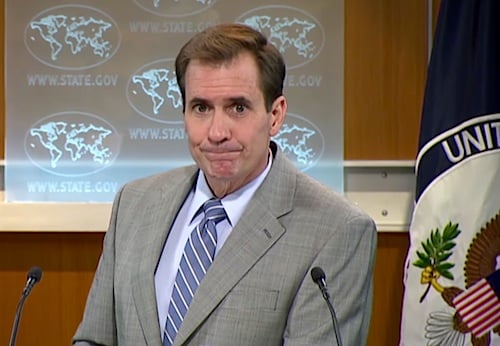
At the State Department’s daily briefing today, Spokesman John Kirby conceded that the Syrian government led by President Assad may have a role to play in a “political transition” of the country.
The apparent shift was in response to a reporter who pointed out that Assad is not opposed by the entire population of Syria:
…the Assad regime definitely represents a certain constituency in Syria. The minorities, Christians, even a portion of the Sunnis look at the Syrian regime as their representative, in particular at Bashar al-Assad. Why should Bashar al-Assad be complex nixed out of the process, considering that he controls the larger portion on the ground, proudly asserting themselves as the major power in that conflict on the ground? Why should Assad be nixed out of the process?
State Spokesman Kirby replied:
Nobody said that there wouldn’t be a role for Assad or for the institution of his – institutions of his government in the transition.
It appears to be a slight step back from the previous position that no talks could be held on Syria’s future until Assad is out of power. However, this “shift” is more cosmetic than substantive, as Kirby reiterated that, “nothing’s changed about our position on Bashar al-Assad.”
In fact, a “role in the political transition” is just another way of saying “Assad must go.” It means that even as the facts have changed considerably on the ground, the initial US position — a position that led to US support of jihadist mercenaries to overthrow the Syrian government — has not changed.
Kirby was asked again by a reporter, “[Assad] can’t have a long-term leadership role in Syria?”
He repeated: “That is correct.”
Kirby was then reminded by a reporter that the US government is not the sole decider on what happens to Syria:
But you’re not a mediator in this process. You’re one of the countries that has views.
A point that Kirby conceded, but added:
…many of our European allies have taken very much the same position that we have taken. So it’s not like everybody involved has got widely different views here, but there are some different opinions and perspectives on what a successful transition means and what that looks like.
We’re all on the same page, in other words. But are we?
What is a “political transition”? Is it an election where all sides are allowed to compete freely for the vote of the people? Neither the State Department nor the Washington press corps seem able to stomach that possibility.
One reporter asked Kirby:
…what if there is – through some hideous circumstances, you have completely transparent elections and so on, and Assad is elected? What happens then?
Kirby refused to even entertain that possibility:
That’s a great hypothetical that I’m not going to engage in.
Kirby reiterated the US view that the future of Syria should be decided by a country 6,000 miles away. A view that somehow the United States knows what is better for the Syrian people than the Syrians themselves:
This is about coming together to try to reach a consensus view on what an effective political transition can look like in Syria. … The Syrian people deserve a country that they can call home and they can be safe and secure and stable and have a prosperous future. It needs to be unified; it needs to be whole; it needs to be pluralistic.
Kirby’s language toward accepting negotiation with Iran was similarly truculent: Iran can only be “constructive” if it drops its support for the Syrian government and accepts the Saudi-US-Turk regime change project in Syria.
The US is in denial about Syria. Its hope is that Russia and Iran will, after expending considerable financial and political capital to radically change the realities on the ground in Syria, come around to Washington’s view that Assad must go and a new government made up of the opposition must be installed. Perhaps a caretaker government that can organize “elections” like we have seen in post-coup Ukraine, where the parties out of favor in Washington are simply outlawed and not allowed to compete. Stranger things have happened, but it would be a blunder on par with Russia’s vote in favor of a UN Security Council resolution authorizing no-fly zones over Libya. Russian president Putin made the point that Syria’s political future should be decided by Syrians alone. It is a position based on the concept of state sovereignty that the US so closely guards in itself but discounts in others.

